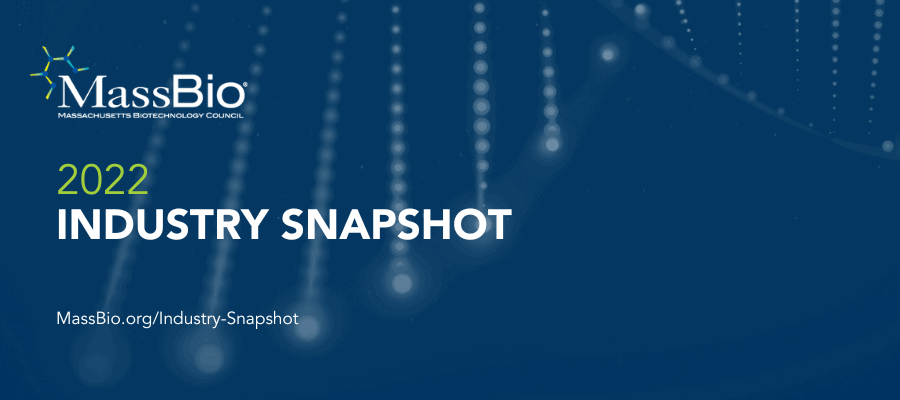
No one could have predicted how a global pandemic would impact much of anything, let alone the life sciences ecosystem in the United States. Though COVID-19 certainly at times kept scientists and policymakers guessing its next move, it also opened the eyes of many to what is possible when a vaccine is needed quickly to tackle a deadly virus and jumpstart an economy. It gave more people an appreciation of what goes into research and development, and greater insight into the drug development pipeline.
The unique economic circumstances brought on by the novel coronavirus also attracted new investors to the biotech industry that drove enormous fundraising rounds, eye-popping IPOs, and a building boom—a wild ride that had to slow down at some point. And that came in the form of an industry reset in late 2021 where public biotech valuations declined significantly, and the IPO window for biotechs all but closed.
We are likely still in the middle of this reset, but as MassBio’s 2022 Industry Snapshot documents, the biopharma industry in Massachusetts is in no way losing its mojo as a life sciences powerhouse.
Largely due to record breaking VC funding in 2020 and 2021, the large number of companies that did go public those years, and established biopharma companies with significant dry powder, the Massachusetts life sciences industry experienced significant growth last year, with research & development leading the way and the number of biomanufacturing jobs increasing considerably. A continued regional expansion of the biomanufacturing industry led to a 15.2 percent increase in year-over-year employment growth for that sector.
It is easy to point to the lack of IPOs and downturn in biopharma stock valuations to write a eulogy for the biotech industry, but our Snapshot shows that reports of its death are greatly exaggerated. MassBio’s review of local venture capital investment in Massachusetts-headquartered biopharma companies shows that the first six months of 2022 had the 4th highest amount of any full year—already besting 2019’s (at the time) record breaking year. And it is happening outside of Kendall Square in Waltham, Bedford, and Watertown, just to name a few emerging and growing clusters.
This regionalization is no accident; but more importantly, it is critical to the Commonwealth maintaining its leadership. For this regionalization to happen, companies needed room to expand, and flush with cash, a lab and Good Manufacturing Practice (GMP) space building explosion happened to the tune of 15 million square feet in 2021. Now boasting a total of 55 million square feet of life sciences specific facilities, companies can find what they need beyond Cambridge, where vacancy rates remain extremely low—rather than overcommitting when expansion opportunities were limited. Cities and towns around the state have become part of the solution by broadcasting their commitment to expedited permitting as BioReady communities.
Years ago, companies realized the value of locating their R&D in Massachusetts—being near the talent and the pioneering founders that are our state’s calling card. With more companies wanting their manufacturing close to their R&D and encountering a current workforce that is less than enthusiastic about returning to long commutes and half-empty offices, they are now looking to the suburbs and regional urban centers for their next act.
What can industry find in the ‘burbs and Gateway Cities? Willing partners in mayors and local officials. A diverse and untapped talent pool, especially individuals from marginalized and underrepresented communities who are a certificate or apprenticeship away from a biomanufacturing career. Neighborhoods and downtowns with the amenities young workers are seeking, with potentially lower costs of living, more affordable housing options, and dramatically easier commutes.
MassBio’s Industry Snapshot gives us a look into an industry that has grown in leaps and bounds over the last several years, and one that is giving opportunity to residents in the form of long-term, well-paying careers, and communities through economic development. It also gives indications of where the industry and public policy must go to keep pace with competition from other states. But at the end of the day, one needn’t look beyond the drug development pipeline numbers to see why our cluster is so important: it continues to bring drugs to market and deliver hope for patients around the world.
About Ben Bradford

Ben joined the MassBio team in 2017. As Vice President of Economic Development and Workforce, he oversees MassBio’s relationship with municipalities, international organizations, and the local real estate and development community. He also works with member and non-member companies to support their decision-making on relocation or expansions. Through relationships with foreign economic development agencies, Ben works to connect foreign companies to the US market. Additionally, he serves as a resource for Massbio member companies as they look to grow their operations in Massachusetts from a personnel standpoint.
Prior to MassBio, Ben worked as Director of Business Development and Regional Strategy at the Massachusetts Life Sciences Center where he was responsible for recruiting new companies to do business in Massachusetts and developing relationships with municipalities across the Commonwealth with the goal of expanding the industry state-wide.
Ben has a B.A. in Political Science from Union College(NY). He lives in North Reading with his wife and two kids.